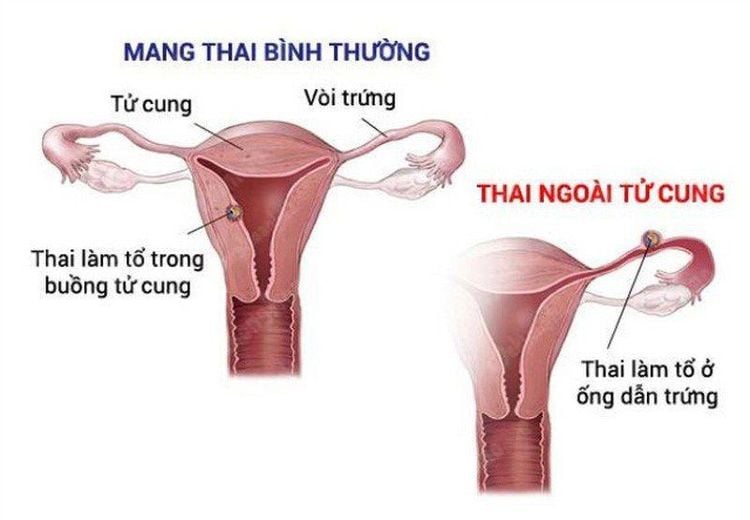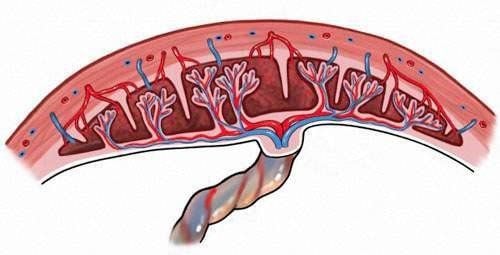This is an automatically translated article.
The article was consulted with Specialist Doctor II - Nguyen Thi Minh Tuyet - Head of Obstetrics and Gynecology Department - Vinmec Central Park International General Hospital.Bleeding during pregnancy is not uncommon. However, in fact, pregnant women should not be too worried, because there are many women who have experienced this symptom but still "mother round and square".
1. Bleeding during pregnancy is pathological?
Bleeding during pregnancy can have many causes. Sometimes, this is a sign of a serious illness. Pregnant women may bleed during the first month of pregnancy or the following months of pregnancy. However, bleeding in the early stages is more common. In most cases of pregnant women bleeding is not pathological. On the other hand, bleeding in late pregnancy is usually more severe. When noticing symptoms of bleeding, it's best to go to the hospital to see an obstetrician-gynecologist for prompt care and treatment.
2. Is bleeding during pregnancy common?
Bleeding in the first trimester of pregnancy occurs in about 15% - 25% of pregnant women. Light bleeding or spotting is common within 1-2 weeks after insemination. The cervix is the most likely area for bleeding, because this area is full of blood vessels that develop during pregnancy. However, it is possible to bleed during sex, after a Pap test or a pelvic exam.
Trắc nghiệm: Bạn có hiểu đúng về dấu hiệu mang thai sớm?
Các dấu hiệu mang thai sớm không phải chỉ mỗi trễ kinh mà còn có rất nhiều dấu hiệu khác như xuất huyết âm đạo, ngực căng tức,… Điểm xem bạn biết được bao nhiêu dấu hiệu mang thai sớm thông qua bài trắc nghiệm này nhé!
3. Causes of bleeding in early pregnancy
3.1 Miscarriage A miscarriage (or miscarriage) is the natural death of a fetus during the first 13 weeks. Miscarriage occurs in about 10% of pregnancies. Bleeding and cramping are two common signs of miscarriage. However, about half of women who have a miscarriage have no prior bleeding.
3.2 Ectopic pregnancy An ectopic pregnancy occurs when a fertilized egg does not implant in the uterus as it should, but instead implants somewhere else (outside the uterus), usually in one of the uterus. fallopian tubes. If the fallopian tube ruptures, the pregnant woman will bleed. Excessive blood loss can cause weakness, fainting, pain, shock, and even death.
Sometimes, vaginal bleeding is the only sign of an ectopic pregnancy. Other symptoms include abdominal pain, pelvic pain, or shoulder pain. These symptoms are likely to occur before you even know you are pregnant.

4. Causes of bleeding in the later stages
Common causes of light bleeding during pregnancy in later months include: inflammation or proliferation of cervical cells. Heavy bleeding is a more serious sign. Excessive bleeding is likely due to something related to the placenta. This could also be a sign of preterm labor. If you experience bleeding in the last months of pregnancy, go to the hospital right away.
4.1 Placental problems Some problems related to the placenta can lead to bleeding in the last months of pregnancy:
Placental abruption: In this case, the placenta separates from the wall of the uterus. before or during birth. The most common signs are vaginal bleeding, abdominal pain, and back pain. Placental abruption can cause serious complications if not detected early. The baby is likely not getting enough oxygen, and the pregnant mother can lose a huge amount of blood, seriously affecting the life of both mother and baby. Placenta previa (placenta previa): Occurs when the placenta is at the lowest position of the uterus, resulting in the placenta covering part or all of the cervix. This phenomenon, known as placenta previa, presents with vaginal bleeding that is painless. In some cases, placenta previa resolves on its own after about 32 to 35 weeks of pregnancy as the lower part of the uterus extends outward. The birth process can take place normally. However, if the placenta doesn't go away on its own, you'll need to perform an early delivery by caesarean section. Placenta: When the placenta (or part of the placenta) adheres to the wall of the uterus and cannot be separated. The placenta causes third-trimester bleeding and severe blood loss during delivery, which is life-threatening for the pregnant woman. Most of these cases were discovered during routine ultrasound and antenatal check-ups. Sometimes, the condition is not discovered until the baby is born. Your obstetrician will carefully prepare for your labor and make sure to deal with any eventualities. However, pregnant women should choose to give birth at a reputable hospital that specializes in obstetrics. A hysterectomy is usually done soon after giving birth to prevent a woman from losing too much blood.

4.2 Signs of Premature Birth Bleeding during pregnancy can be a sign of labor, especially in the last months of pregnancy. However, if labor occurs before 37 weeks of gestation, it is most likely a sign of preterm labor. Other signs of preterm labor include:
Change in vaginal discharge (vaginal becomes wet, thick with mucus, possibly bloody) or increased vaginal discharge. Feeling pressure in the pelvis or lower abdomen Persistent, dull lower back pain Mild abdominal cramps, possibly with diarrhea Continuous, but usually painless, uterine contractions (occurs 4 times every 20 minutes, or 8 times an hour, continuously for several hours) Your water breaks (amniotic fluid comes out a lot or comes out slowly) Pregnant women with bleeding need to go to the hospital to see a doctor immediately , even when the bleeding has stopped. Pregnant women will have a vaginal examination, ultrasound, blood and urine tests to assess bleeding during pregnancy, thereby finding the cause and the most optimal treatment.
Bleeding during pregnancy usually occurs in the first or third trimester of pregnancy. This is a sensitive time and is also a sign of extremely dangerous diseases such as: ectopic pregnancy, miscarriage, placental abruption, placenta previa, placenta accreta, premature birth. Therefore, you should not be subjective, need to immediately go to a reputable medical facility for early examination and treatment.
To protect the health of the mother and baby comprehensively as well as help the mother feel more secure during labor, Vinmec provides a full Maternity service. With this package, the mother will have regular antenatal check-ups and routine tests to monitor her health. The fetus is monitored for fetal heart rate and uterine contractions by obstetric monitor at 37-40 weeks of expected time of delivery. If the baby is born prematurely, they will be cared for and raised with international standards. Premature births are organized in a methodical manner under the coordination of many specialties: obstetrics, anesthesiology, and especially neonatology and paediatrics. This helps to reduce the risks and increase the effectiveness of treatment for health problems that premature babies may have. As a result, the technique of treating premature babies at Vinmec has achieved extremely positive effects, saving the lives of many seemingly hopeless premature births.
If you have a need to use maternity services at Vinmec, please register directly at the website to be served.

Please dial HOTLINE for more information or register for an appointment HERE. Download MyVinmec app to make appointments faster and to manage your bookings easily.
References: Acog.org














